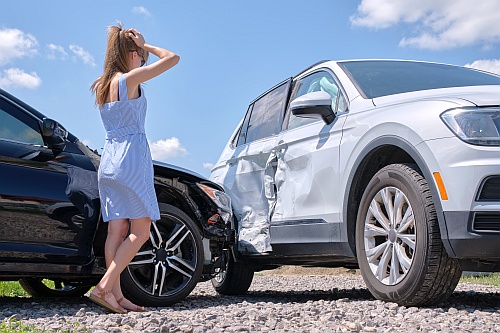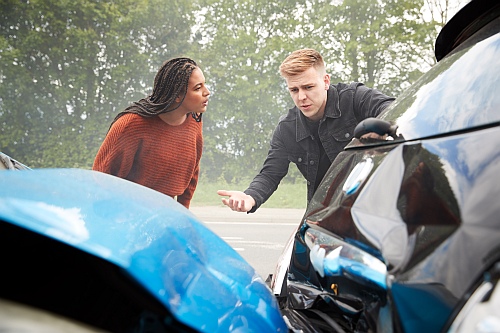A common issue that arises in slip-and-fall litigation is whether the business owner had knowledge of the foreign substance on which a plaintiff slipped and fell. Given that employees are generally not inclined to acknowledge their actual knowledge of the dangerous condition, plaintiffs must typically use direct or circumstantial evidence to show “constructive knowledge” of the foreign substance. Thus, many cases turn on what evidence the plaintiff and the defendant present to show or rebut constructive knowledge of the foreign substance. This battle is pointedly illustrated in Alatrista v. Publix Super Markets, Inc., a recent decision from the Atlanta Division of the U.S. District Court for the Northern District of Georgia.
This case arose from a slip-and-fall at a local Publix Supermarket. The plaintiff in this case and her boyfriend were shopping at the supermarket when the plaintiff slipped and fell on a puddle of clear liquid on the floor of the main aisle just beyond the cash registers at the store. The plaintiff testified that she had not seen the puddle prior to falling, and that, even after the fall, the puddle was not visible from a standing position. The plaintiff’s boyfriend also testified that he inspected the area after the fall and stated that the puddle was difficult to see. Publix has a stated “Don’t Pass It Up — Pick It Up” policy, and four employees testified that they, in accordance with this policy, inspected the area shortly before the incident. Each employee testified that he or she did not see any foreign substance when he or she passed the area and that he or she would have cleared the substance had he or she noticed it. The plaintiff brought suit against Publix for injuries associated with the fall, and, following discovery, the Publix moved for summary judgment, arguing that there was no issue of material fact for a jury to determine with respect to Publix’s constructive knowledge of the alleged puddle such that it was entitled to judgment as a matter of law.
As noted above, slip-and-fall cases require that a plaintiff show that “(1) the defendant had actual or constructive knowledge of the foreign substance and (2) the plaintiff lacked knowledge of the substance or for some reason attributable to the defendant was prevented from discovering it.” Shepard v. Winn Dixie Stores, Inc., 241 Ga. App. 746, 747 (1999). Since there was no employee admission to knowledge of the puddle or other evidence sufficient to demonstrate “actual knowledge,” such as testimony from a third party that he or she informed the employees of the puddle, the plaintiff needed to show that Publix had constructive knowledge of the puddle. Two common methods for establishing constructive knowledge in slip-and-fall cases are “1) show[ing] that an employee of the defendant was in the immediate area of the hazard and could have easily seen it, or 2) show[ing] that the foreign substance remained long enough that ordinary diligence by the defendant should have discovered it.” Mock v. Kroger Co., 267 Ga. App. 1, 2 (2004). With respect to proof necessary to satisfy the two-prong approach for establishing constructive knowledge, a plaintiff need not show exactly how long the substance had been in the area unless a defendant “has established that reasonable inspection procedures were in place and followed at the time of the incident.” Fred’s Stores of Tennessee, Inc. v. Davenport, 307 Ga. App. 58, 59 (2010). When such inspection processes are in place, and inspection revealed no hazard shortly before a fall, the plaintiff must demonstrate fault in the inspection process such that it did not amount to an exercise of ordinary diligence.
In this case, the district court determined that granting summary judgment in favor of Publix was warranted for two reasons. First, as noted above, the defendant proffered testimony from four different employees, who all inspected the area within 30 minutes of the fall without noticing the puddle. In response, the plaintiff simply stated that the defendant had not reinforced this evidence with corroborating zoning logs. However, the court noted that the plaintiff had neither submitted her own evidence suggesting that the inspection had not been performed nor provided a reason for questioning the credibility of the employees. Under Georgia law, “when an owner shows that an inspection occurred within a brief period of time prior to [a] fall, the inspection procedure was adequate as a matter of law and defeats an invitee’s negligence action.” Mucyo v. Publix Supermarkets, Inc., 688 S.E.2d 372, 375 (2009). Since several of purported inspections occurred within a brief period of the fall, including one within two minutes of the fall, the court determined that the defendant was entitled to judgment as a matter of law. Although that reason would’ve been independently sufficient, the court went on to note that constructive knowledge requires that the hazard be one that could have been easily discovered and corrected. Chastain v. CF Georgia North Dekalb L.P., 256 Ga. App. 802, 804 (2002). In this case, the plaintiff’s admission and her boyfriend’s testimony regarding the difficulty of seeing the puddles undermine such a finding. Thus, there existed an alternative ground for granting summary judgment.
Proving a slip-and-fall case is a far from straightforward endeavor. Indeed, it is often difficult to acquire the necessary evidence to prove a claim, and even when some evidence is available, many businesses have implemented policies that help to minimize liability. Accordingly, if you’ve been injured in a possible slip-and-fall, you should consider hiring experienced legal counsel to help prepare the strongest possible case. The premises liability attorneys at the Law Office of Terrence R. Bethune have litigated many premises liability cases in Georgia state and federal courts and are prepared to offer you the benefit of their experience. Feel free to contact us if you are interested in a free case consultation.
Related Posts:
Jury Finds in Favor of a Georgia Cleaning Company for Slip and Fall
Georgia Court of Appeals Examines Liability for Independent Contractor in Macon Premises Liability Case
Federal Court Denies Summary Judgment in Premises Liability Case Involving Atlanta Metro Area Wal-Mart
Subject Related Articles

Navigating Macon Car Accident Claims: Step-by-Step Guide
You’ve been in a Macon car accident, and now you’re faced with insurance claims, police reports, car repairs, and more. It can feel overwhelming trying
June 24, 2024

Avoid These Mistakes After a Car Accident in Carrollton
You’ve just been in a car accident in Carrollton. Even minor fender benders can be stressful events. But before you step out of the car
May 20, 2024

What to Do After a Hit-and-Run Accident
So you’ve just been in a hit-and-run accident. Your first thought is probably to chase down the other driver, but that may not be the
April 19, 2024





